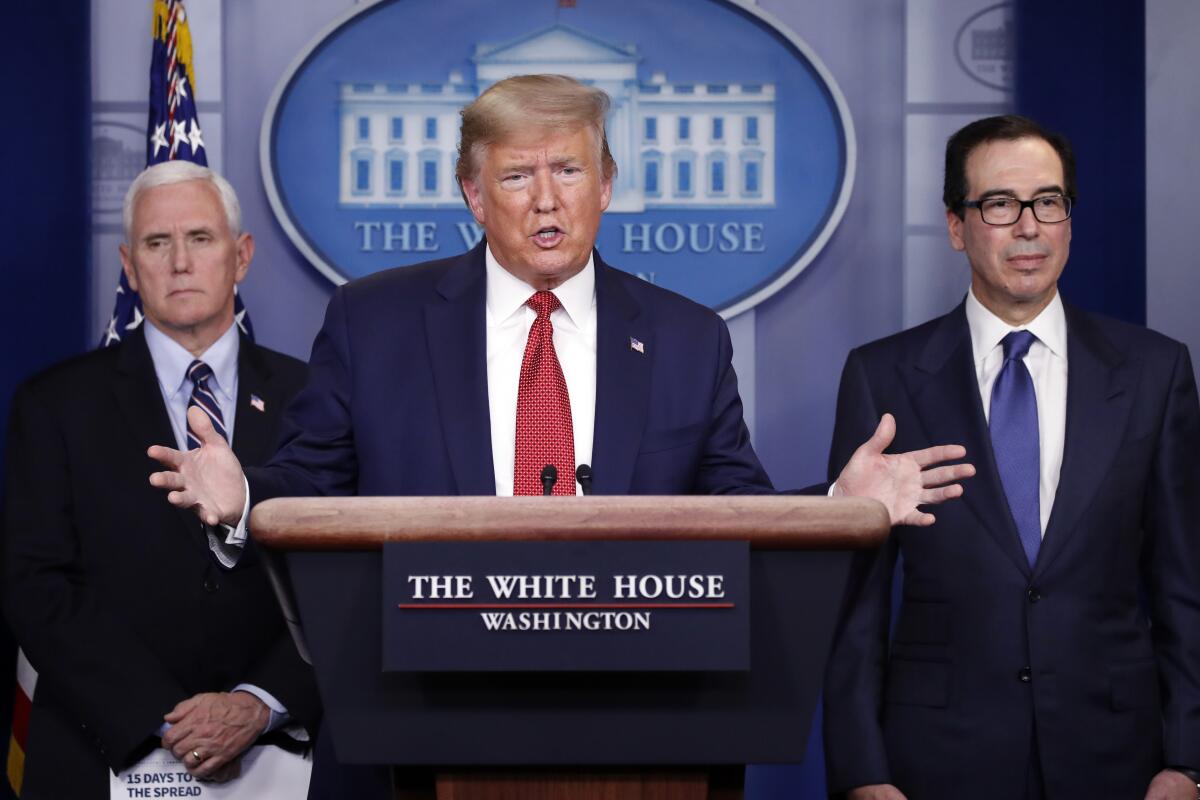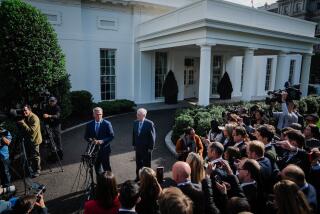How the coronavirus has upended economics in just a few weeks

- Share via
In the heat of a global crisis more sudden and severe than anything in living memory, economic orthodoxies are getting tossed aside at a furious pace. Some of them may be gone for good.
Public debt, for example, has often been seen as a drag on economies — but right now it’s their lifeline. The coronavirus has shut down swaths of private business. In the U.S. alone, it threw about 3 million people out of work in just a week.
Whatever their prior views on budget deficits, leaders have been forced to fill the gap by channeling cash to households, businesses and markets — strengthening safety nets that are paid for out of the public purse, and improvising some new ones.
With government spending helping to steer countries through the pandemic, it may not be easy to turn off the taps afterward. Politicians will have little incentive for belt-tightening measures that could endanger a rebound. Economists, especially from the rising Modern Monetary Theory school, will argue that in a low-inflation world there’s no need to try.
Even when the acute phase of the health crisis has passed, “political pressures for large fiscal stimulus to be deployed whenever possible will remain strong and open-ended,” says Stephen Jen, who runs hedge fund and advisory firm Eurizon SLJ Capital.
That’s what happened to monetary policy after the 2008 crisis, he points out, with central banks still struggling to remove their unconventional stimulus more than a decade later. For the few parts of the developed world that managed to move away from emergency settings, such as the U.S., the pandemic has sent them crashing back there.
In the low-rates era, governments are already the biggest borrowers. Now they’re about to go into overdrive.
The U.S. is poised to smash records with a fiscal package worth about $2 trillion making its way through Congress, and lawmakers expect more measures to follow. Other governments, when measured against the size of their economies, aren’t far behind. The European Union and its powerhouse Germany have ditched once-sacred spending caps. The British government has pledged to cover 80% of the wage bill for workers whose jobs are at risk because lockdowns have shut entire industries. Countries from South Korea to Australia have torn up their budget plans and pivoted to more spending.
Many economists say that even more fiscal firepower may be needed because it won’t be possible to assess the full extent of economic damage until the virus is contained. Once that happens, support for the spending bonanza may be tested — on the markets, and in politics.
The surge in supply of government bonds is likely to push yields higher, though central-bank buying can help keep a lid on them. That’s already an explicit goal of the Bank of Japan, and other countries are set to follow.
In the U.S., investors may rethink the risks lurking in the longest-duration bonds — but that’s likely a problem for down the road, with much of the initial burst of borrowing set to be financed by short-term paper.
Governments may also face political pressure to unwind their largess, and at least some economists are likely to join in.
In the crisis moment, there’s been a shift among even conservative economists, and they’ve united behind “rapid and large fiscal stimulus,” said Adam Posen, who heads the Peterson Institute for International Economics in Washington.“Whether that is an ongoing turning point remains to be seen,” he said. “If we see a recovery, God willing, in months, people will want to turn off the taps.”
Germany, for one, signaled this week that it aims to return to its customary frugal stance — though officials acknowledged further stimulus may be needed first, if the economy is stuck in a deep slump after the public health emergency has abated.
A pickup in inflation — a risk, because the pandemic has shut down so much production — could also make conditions tougher for the borrowers.
But there’s an alternative post-virus future, in which politicians are reluctant to balance the books. Some economists question whether it makes sense to even try.
James Knightley, chief international economist at ING, cites the U.S. case as an example. “I really cannot see Donald Trump, assuming he gets reelected, embarking on an austerity drive to get the fiscal position on a sounder footing,” he said.
For progressive Democrats too, the fiscal debate “should have changed forever,” according to Nobel Prize-winning economist Joseph Stiglitz. After President Trump’s trillion-dollar deficits, it’ll be hard to make the case that “somehow we can’t afford healthcare and education,” he said. “That argument is going to look very different.”
It’s in this scenario that the once-strict dividing lines between fiscal and monetary policy, already looking a bit blurry of late, are likely to get even more so.
“There could be pressure to come up with a plan to see central banks cancel a proportion of government debts around the world,” Knightley said. “There will be more calls for these sorts of extreme measures.”
While deficits and debt have surged to much higher levels during major wars, Deutsche Bank strategists found that public-debt-to-GDP ratios “as a median across the major developed economies” are currently at peacetime records.
Since 2008, central banks have been buying more of that debt, while ultra-low rates made it easier for the governments to keep borrowing. The coronavirus has accelerated their purchases to a new level.
The transactions typically occur in secondary bond markets, letting monetary policy makers claim they’re not directly financing deficit spending — a traditional taboo in policy circles.
That taboo serves no useful purpose, according to Modern Monetary Theory. The theory’s adherents think the traditional fear of budget deficits is overblown. Governments that borrow in their own currencies can’t go broke, their argument goes, so they can spend as long as inflation remains subdued — and there’s no reason why central banks shouldn’t finance them.
That’s a recipe for overspending, according to the mainstream of modern economics. The consensus for decades has been that central banks should be independent from budget-setting governments, and thus able to rein them in.
Jen said that tide may be turning, and “large fiscal deficits fully underwritten by central banks” are likely to become the new normal.“Whether intentional or not,” he says, “we are collectively moving toward” Modern Monetary Theory.
More to Read
Inside the business of entertainment
The Wide Shot brings you news, analysis and insights on everything from streaming wars to production — and what it all means for the future.
You may occasionally receive promotional content from the Los Angeles Times.










